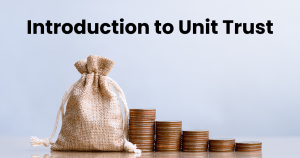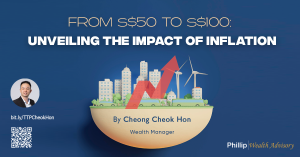Investing in Unit Trusts with POEMS October 18, 2023

In a world of financial unpredictability, where geopolitical tensions and market uncertainties are the new norms, it’s crucial for investors to have diversified strategies to both protect and grow their wealth.
On the 7 October 2023, tensions in the Middle East erupted again due to the Israel-Hamas conflict, resulting in the rise of oil prices over fears of violence spreading in the region. Investors began to move assets to safe havens like gold and currencies such as the Japanese yen. A familiar cycle began to play out. Not long ago, there were fears about what the Federal Reserve would do with interest rates.
Prior to that, the crisis in Ukraine had everyone on edge. Navigating these uncertainties to both protect and grow your savings can be daunting. The traditional method of keeping money in a bank savings account or a fixed deposit may offer a sense of security but what if you want to be a little adventurous and aim for a potentially higher return?
How about unit trusts?
A unit trust is a collective investment vehicle, pooling funds from many investors and placed under the management of a professional. Generally, a fund manager takes on this role and strategically allocates the pooled capital into various assets such as stocks, bonds, money market instruments, a combination of these investments, or even other funds.
Unit trusts typically invest in a portfolio of stocks and/or bonds issued by different companies, often in different industries or regions. This means that the poor performance of any one security or business sector is not likely to have a major adverse impact on an individual’s investment as a whole.
Investing in unit trusts allows one to gain access to overseas markets with ease, and invest in products that might not be otherwise affordable. For instance, corporate bonds require a minimum investment of S$250,000 and are only accessible by Accredited Investors. As such, unit trusts present an accessible alternative for investors seeking exposure to such bonds at a relatively lower entry level.
What a unit trust does essentially is that it gives you exposure to a diversified range of investments included in that fund. The collective holdings of the assets held by the trust will make up the fund’s total portfolio.
Understanding the Risk Profile of Unit Trusts
A diversified portfolio minimises the overall risk associated with investing in individual companies. Investment is made across various asset classes and sectors, reducing the overall impact of market volatility. Having investments across different funds ensures that industry-specific and enterprise-specific risks are low.
The costs associated with buying units in a mutual fund may also be lower than buying different individual equities and bonds. The costs of accessing extensive research as well as administrative, operating and trading expenses are spread amongst a large number of unit trust investors.
Unit trusts are predominantly open-ended investments that investors can buy and sell on a daily basis. Fund management companies are mandated to meet all ‘sell’ requests from the unit holders.
The investments will be monitored regularly by the fund managers who will make investment decisions based on research and analytical tools that the general public may not have access to.
Who decides what to invest in?
Fund managers make the decisions regarding the assets that a unit trust invests into. When you invest in a unit trust, you relinquish control over the choice of individual bonds, shares and other assets that comprise the fund. Although the investment direction of the fund may be pre-determined, the specific needs of individual investors might not be considered.
Similar to any other investment, there is always an element of risk when investing in unit trusts. Although the risks are relatively lower as compared to direct investments in equities, it is not entirely eliminated as unit trusts are not capital-protected investments.
If you’re considering how much cash to allocate for unit-trusts, you might consider setting aside 20-30% of your monthly salary to invest in funds on a regular basis. Moreover, a 4-3-2-1 approach can be implemented where 40% is used for expenses, 30% for investing, 20% for insurance and 10% for savings. Before implementing this strategy, it is advisable to have at least 6 months’ salary saved up as emergency funds.
Need a helping hand to navigate your investment portfolio?
It is prudent to seek professional advice from our knowledgeable experts to help grow your investments.
Vince Koh has been a part of the PhillipCapital team for more than 7 years. He specialises in investment and insurance portfolio planning for clients and contributes financial literacy content through media engagements. He serves as a Key Opinion Leader on Wealth Planning as part of the company initiative as well. If you’d like to consult with Vince, you may call to schedule an appointment with him and explore investment options for a specific pool of funds.
How long should you keep your money in a Unit Trust before cashing out?
Vince recommends that the longer one holds on to the investment, the more time it will have to go through multiple market cycles. He recommends that the short-term holding period should be around 1-3 years, the medium term period to be around 3-5 years and the long-term period will stretch from 10 years and beyond. The holding period can also influence the investment recommendations.
For example if the investment horizon is short, then the funds should be allocated to safer options such as money market funds or bonds as the investor might require quicker access to the funds to achieve investment goals.
Enjoy: 0% Platform fees; 0% Sales charge; 0% Switching fees with POEMS
Annual Management Fees and Trustee Fees are the only applicable fees associated with POEMS. The management fee serves to cover the costs of operating the fund as well as the fund managers’ expertise in managing the fund. The trustee fee is charged by the trustee for providing custodian services for safekeeping the fund’s assets. The management fee usually ranges from 0.5% to 2% and the trustee fee usually ranges from 0.1% to 0.15%.
Disclaimer
These commentaries are intended for general circulation. It does not have regard to the specific investment objectives, financial situation and particular needs of any person who may receive this document. Accordingly, no warranty whatsoever is given and no liability whatsoever is accepted for any loss arising whether directly or indirectly as a result of any person acting based on this information. Opinions expressed in these commentaries are subject to change without notice. Investments are subject to investment risks including the possible loss of the principal amount invested. The value of the units and the income from them may fall as well as rise. Past performance figures as well as any projection or forecast used in these commentaries are not necessarily indicative of future or likely performance. Phillip Securities Pte Ltd (PSPL), its directors, connected persons or employees may from time to time have an interest in the financial instruments mentioned in these commentaries. Investors may wish to seek advice from a financial adviser before investing. In the event that investors choose not to seek advice from a financial adviser, they should consider whether the investment is suitable for them.
The information contained in these commentaries has been obtained from public sources which PSPL has no reason to believe are unreliable and any analysis, forecasts, projections, expectations and opinions (collectively the “Research”) contained in these commentaries are based on such information and are expressions of belief only. PSPL has not verified this information and no representation or warranty, express or implied, is made that such information or Research is accurate, complete or verified or should be relied upon as such. Any such information or Research contained in these commentaries are subject to change, and PSPL shall not have any responsibility to maintain the information or Research made available or to supply any corrections, updates or releases in connection therewith. In no event will PSPL be liable for any special, indirect, incidental or consequential damages which may be incurred from the use of the information or Research made available, even if it has been advised of the possibility of such damages. The companies and their employees mentioned in these commentaries cannot be held liable for any errors, inaccuracies and/or omissions howsoever caused. Any opinion or advice herein is made on a general basis and is subject to change without notice. The information provided in these commentaries may contain optimistic statements regarding future events or future financial performance of countries, markets or companies. You must make your own financial assessment of the relevance, accuracy and adequacy of the information provided in these commentaries.
Views and any strategies described in these commentaries may not be suitable for all investors. Opinions expressed herein may differ from the opinions expressed by other units of PSPL or its connected persons and associates. Any reference to or discussion of investment products or commodities in these commentaries is purely for illustrative purposes only and must not be construed as a recommendation, an offer or solicitation for the subscription, purchase or sale of the investment products or commodities mentioned.

 How to select a unit trust
How to select a unit trust  Introduction to unit trust
Introduction to unit trust  From $50 to $100: Unveiling the Impact of Inflation
From $50 to $100: Unveiling the Impact of Inflation  Why 2024 Offers A Small Window of Opportunity and How to Position Yourself to Capture It
Why 2024 Offers A Small Window of Opportunity and How to Position Yourself to Capture It 









